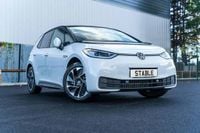Volkswagen has ignited a heated debate among car owners and industry watchers alike with its latest move: locking extra horsepower on its ID.3 electric vehicles behind a digital paywall. As of August 19, 2025, British customers can pay £16.50 (about $22.50) per month, £165 ($225) annually, or a one-time lifetime fee of £649 ($878) to unlock the full 228 horsepower from their ID.3 Pro or Pro S models. Without the upgrade, the cars are limited to 201 horsepower, despite being certified at the higher figure from the factory, according to reporting by Auto Express and The Economic Times.
The optional power upgrade is enabled via software, requiring no hardware changes or trips to the dealership. Instead, Volkswagen can remotely activate the extra 27 horsepower and 34 lb-ft of torque, offering what it calls a "sportier driving experience" to those willing to pay. The upgrade is tied to the vehicle itself, meaning that if a customer opts for the lifetime purchase, the next owner will inherit the boosted performance—a detail that could influence resale values and insurance considerations.
Volkswagen defends the move as a modern extension of a long-standing automotive tradition. "Offering more power to customers is nothing new – historically many petrol and diesel vehicles have been offered with engines of the same size, but with the possibility of choosing one with more potency," a company spokesperson told Auto Express. The company argues that this approach allows buyers to avoid paying a higher upfront price for features they might not want or need at the time of purchase, with the flexibility to add them later.
But not everyone is convinced. Social media erupted with criticism, with many customers accusing Volkswagen of "artificial gatekeeping" and a "cash grab." Some see the move as emblematic of a broader trend toward subscription-based features in the auto industry, where even heated seats and remote start functions have been offered for a monthly fee by brands like BMW and Toyota—often to consumer backlash. As Fortune notes, BMW famously abandoned its subscription fee for heated seats after widespread criticism, with former board member Pieter Nota admitting, "People feel that they paid double—which was actually not true, but perception is reality, I always say. So that was the reason we stopped that."
Volkswagen, for its part, claims the response to its power-on-demand feature has been largely positive. "So far the customer feedback has been positive. They have the opportunity to still enable additional functions that they may not have considered or needed when they first ordered their car," a spokesperson told Fortune. The company has been offering the power upgrade since May 2024 as part of a broader digital strategy, which also includes subscriptions for Adaptive Cruise Control, Navigation, Voice Assistant, and seat heating.
Still, the numbers suggest a shift in consumer sentiment. According to a July 2025 S&P Global report cited by Fortune, the proportion of drivers willing to pay for car-connected services has dropped from 86% in 2024 to just 68% this year. This decline reflects growing skepticism about the value of paying recurring fees for features that, in many cases, are already built into the car’s hardware and simply require a software switch to activate.
Industry analysts see the move as part of a larger transition toward software-defined vehicles, where manufacturers can tailor features to each customer and even add new functions over time via over-the-air updates. Joseph Yoon, a consumer insights analyst at Edmunds, told Fortune, "As cars become more and more software driven—especially EVs—it makes sense that Volkswagen would build just one car, and let software determine its features and options." However, Yoon adds, "The uphill battle for automakers is convincing customers that they aren’t ‘double paying’ for a feature set. That perception will likely linger as many customers still associate features and options with hardware rather than software, so shifting that mindset will be the most difficult task."
Volkswagen’s approach is not unique. Mercedes-Benz offers an "Acceleration Increase" subscription for its EQE and EQS electric cars, while Tesla allows Model Y owners to pay a one-time fee for an "Acceleration Boost." Polestar and Volvo have also rolled out performance upgrades that can be unlocked for a fee, often through a simple software update. This trend is expected to accelerate as automakers seek new revenue streams to offset the slimmer profit margins of electric vehicles and the rising costs of development.
Yet, the backlash is not just about money. For many, it’s a question of principle. Why should a car owner pay extra for performance that the vehicle is already technically capable of delivering? And what does this mean for the future of car ownership, where features once included in the sticker price may become the subject of ongoing monthly payments? As TechRadar points out, "It could also be the case that paying a small fee each month to unlock a feature becomes more expensive than it was when customers could option it outright, with Netflix-style incremental price increases making motoring more expensive than it needs to be."
There’s also a practical angle: aftermarket tuners and hackers have long offered ways to extract more performance from vehicles, often for less than what manufacturers charge—albeit at the risk of voiding warranties. With Volkswagen’s software being particularly popular among hackers, some expect that unofficial power unlocks will soon be available, just as chip tuning has been for combustion engines.
For now, the subscription-based power upgrade is only available in the UK and select European markets. Volkswagen has not confirmed any plans to introduce the feature in the U.S., but industry watchers say it’s only a matter of time before such models become commonplace worldwide.
Meanwhile, Volkswagen faces other challenges. The automaker reported a $1.5 billion hit from tariffs in 2025, which, along with the lower profit margins of electric vehicles compared to traditional models, has prompted a search for new ways to boost revenue. The power-on-demand feature is just one piece of a larger puzzle as Volkswagen and its competitors navigate the rapidly changing landscape of automotive technology and consumer expectations.
As the line between hardware and software continues to blur in the world of electric vehicles, the battle over what should—and shouldn’t—be a subscription is likely to intensify. For Volkswagen, the road ahead may be paved with opportunity, but also with plenty of bumps as it tries to convince drivers that paying monthly for horsepower is a fair trade for flexibility and choice.





